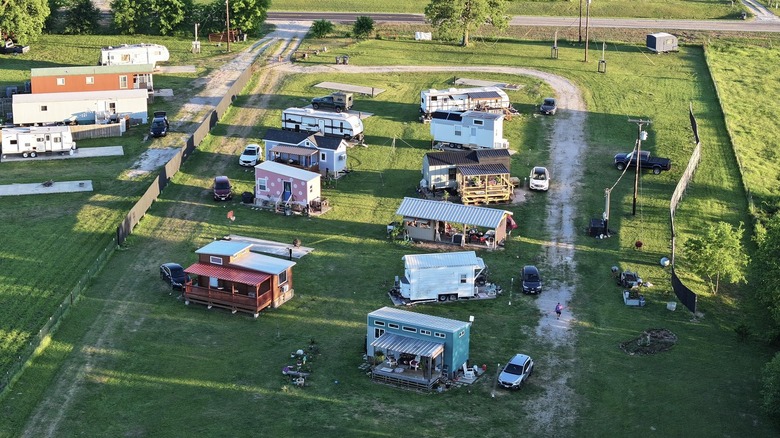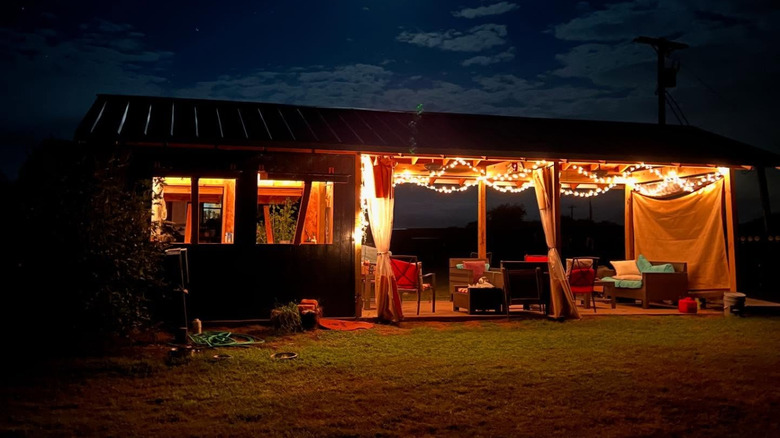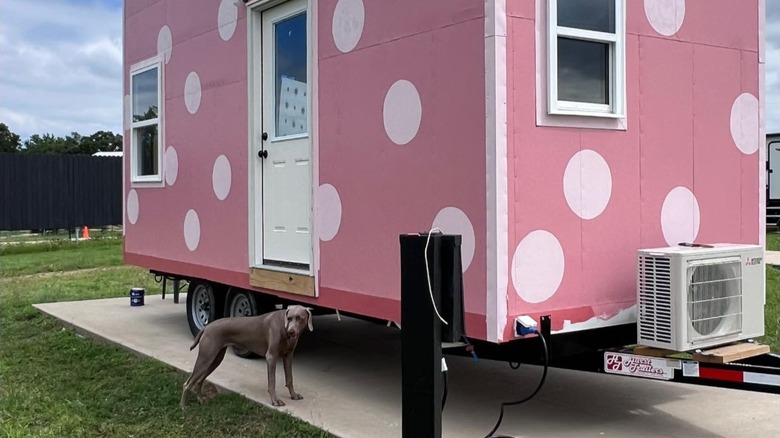Texas' Unique All-Women Tiny Home Retirement Village Offers Dreamy Community Living
Across the U.S., millions of older adults live alone, and the so-called "grey revolution" — driven by rising divorce rates, childlessness, longer lifespans, and the dispersal of families — falls especially hard on women. According to the U.S. Census Bureau, nearly one-third of adults over 65 live alone (excluding seniors in nursing homes or other long-term care facilities), and women make up a disproportionate share. Add to that increased financial vulnerability: An AARP survey found that nearly 40% of women ages 50 to 64 say the economy is not working for them compared with 33% of men in the same age group. Meanwhile, a Goldman Sachs report found that 28% of retired women have less than $50,000 in savings. Rising living costs further diminish flexibility for retirees, who must seek more affordable places to live. But in rural northeast Texas, one community is defying those trends: The Bird's Nest.
Located in Cumby (about an hour northeast of Dallas) is a small, gated RV-and-tiny-house neighborhood that offers a supportive community for older women who want to live independently but not alone. About 11 women live on site, and hundreds more have applied for a spot. Founded in 2022 by now-70-year-old Robyn Yerian, herself a single empty-nester, The Bird's Nest was born from concern about rising living costs in Dallas. After researching options, she withdrew money from her 401(k) to purchase 5 acres of Texas prairie for $35,000, then invested an additional $150,000 developing it into an R.V. park, with a connecting road, paved concrete pads, and electric and septic hookups. Those pads, which can support RVs or tiny homes, rent for $450 a month — nearly half the average rent cost in Cumby. "Getting zoned was the hardest part," Yerian told Realtor.com. "Most counties do not want RV parks."
The community is diverse, but supports each other
The Bird's Nest is home to a diverse group whose politics, sexualities, ages, backgrounds, and religions span the spectrum. Some women have been married and divorced; others have never married. But they all share a commitment to one another and to the community's guiding principles, which emphasize mental wellness and values such as non-judgment, connection, and helping hands. There aren't many formal rules, but the unofficial one is simple: "No drama." As its website puts it, "This community is female owned, developed and operated. It is dedicated to women empowering women along their journey. We encourage, help, console and laugh with each other. There is no 'you're doing it wrong' or 'that won't work' here."
Founder Robyn Yerian envisioned open green spaces, so the lots are spaced generously. Though there are no mature trees yet, many residents tend to a shared garden and cultivate their own landscaping. The neighborhood features a fire pit, storm shelter, a community "kitchen," and offers lawn maintenance and shuttle services. It's pet-friendly– their Instagram often shows pups lounging on porches, and even ducks and turkeys roamed freely for a time. Residents gather regularly for book clubs, crafts, game nights, yoga, and other activities. When a photographer from The New York Times visited, she found several women working on tile mosaics of their home address numbers.
Women live comfortably here, not only because the cost of living is affordable but also because of the small group support. "If someone gets to the point where they can't move around too much, we're ready to jump in and help to a certain extent," Yerian shared with RNZ. "We're going to do whatever we can to enable people to stay here as long as they possibly can."
This supportive community could be replicated
As you might imagine, securing a spot at The Bird's Nest is competitive, and many applicants are turned away. Prospective residents must visit in person to see if it's a mutual fit — a vital consideration for such a small, intentional community. "We drive each other to doctor's appointments," Robyn Yerian shared, underscoring the expectation that residents embrace the community's ethos. "We look in on each other if someone has the flu or surgery. We are each other's therapists and sounding board."
Though The Bird's Nest sits just 65 miles from Dallas, with its urban sprawl and bustling arts district, and 44 miles from Canton, world-famous for its massive flea market, it feels a world away. Gardens, a pink-and-polka-dot tiny home, cozy porches, and a close-knit daily rhythm define the space. After the community gained viral traction in 2025, many online praised the value of such a living arrangement. "I want that sort of golden girls lifestyle when I get that age," wrote West_Cat9014 on Reddit. "Seems like a good option!" Another, Top_Impress_1323, agreed. "We need more of these types of communities where people look out for each other. What a wonderful world it would be!"
The Bird's Nest model could be replicated, and Yerian believes it should be. Poverty and loneliness are both linked to shorter lifespans, and mutual community aid could be the solution to what the AARP terms a "retirement crisis." While the rising popularity of tiny homes is often directed toward hotels and short-term rentals in places like Portland, it's clear they can also serve as the foundation for cost-effective, long-term communities. "I've encouraged others to just go for it," Yerian said. "Quit saving that little bit of money and invest in a community ... The sense of community is everything."


